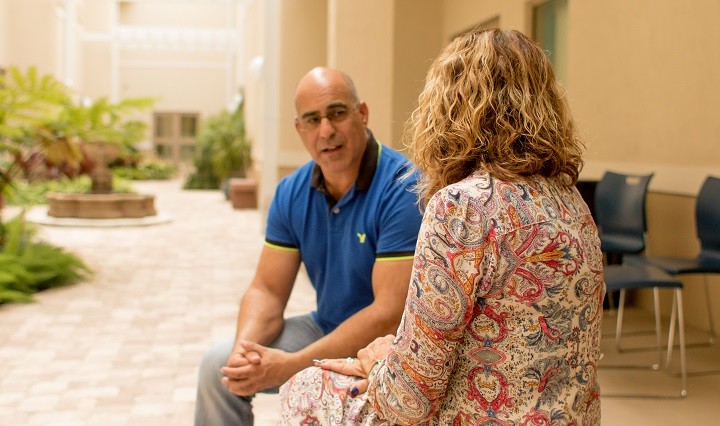Treating PTSD Symptoms
Explore effective strategies for treating PTSD symptoms and see how we at Synergy Health remain dedicated to providing support for those seeking recovery. With convenient PTSD recovery center locations in CT, FL, and PA, we are steadfast in our support for everyone in need.
About Post Traumatic Stress Disorder (PTSD)
Post-traumatic stress disorder (PTSD) develops in response to experiencing or witnessing a traumatic event and can be difficult to overcome without targeted PTSD treatment. The disorder is incredibly common, with about 7-8 percent of the U.S. population expected to experience PTSD at some point in their lives, according to the U.S. Department of Veterans Affairs. It is also more treatable today than ever before.
It is estimated that 60 percent of men and 50 percent of women will experience at least one traumatic event in their lives, and for many of those individuals, these events will have lasting effects that may require therapeutic intervention. Types of trauma that may lead to PTSD include physical or sexual assault, accidents, exposure to violence, including domestic violence, combat, and exposure to natural disasters.
It is important to note that PTSD can happen to anyone at any age and is not a sign of weakness. With therapeutic support, treating PTSD symptoms becomes successful, with many individuals able to address their trauma and relieve the symptoms that are causing them distress.

PTSD Symptoms
PTSD manifests in many different ways. Some symptoms may occur immediately after a traumatic event, while others will not be apparent for months or even years.
Be aware of the signs and symptoms of PTSD so that you can notice if someone you love needs support—or even if you yourself are suffering from PTSD.
PTSD symptoms include:
- Nightmares or intrusive thoughts and/or flashbacks regarding a traumatic event
- Irritability, aggression, and/or hostility
- Heightened reactions, fear, and/or paranoia
- Depression and anxiety
- Self-destructive behaviors
- Emotional detachment
- Survivor’s guilt
- Insomnia
- Substance abuse
- Mood swings, including regular feelings of guilt, negativity, or hopelessness
PTSD symptoms can be acute or chronic and may go on for just a short time or persist for years. Often, they are exacerbated by situations that trigger memories of the event. Keep reading for more on treating PTSD symptoms.
How is PTSD Treated?
There are a variety of approaches to treating PTSD symptoms. And often, more than one therapeutic modality is used at a time. Though every PTSD recovery center is different, generally, types of treatments for PTSD fall into the following camps:
Therapy
Cognitive behavioral therapy and psychotherapy are both incredibly helpful for individuals with PTSD. Prolonged exposure therapy is often used as well as part of cognitive behavioral therapy. While there are different types of exposure therapy, all of them help address the traumatic event itself so that the patient can confront the situation in a safe and professionally-guided manner. This may be done through talk therapy, hypnosis, or even virtual reality.
Our Service
Antidepressant medications can be immensely helpful in the treatment of PTSD. There are two kinds that are used: SSRIs (selective serotonin reuptake inhibitors) and SNRIs (serotonin-norepinephrine reuptake inhibitors). Both varieties help stabilize patients during their treatments and are safe and effective for long-term use. Anti-anxiety medications, beta-blockers, and antipsychotics may also be prescribed.

Our PTSD Treatment Program
PTSD can be treated. If you or a loved one is experiencing mental or emotional distress following a traumatic event and looking for treatment centers for PTSD, we encourage you to reach out for help. At Retreat Synergy Health Programs, we offer inpatient and residential treatment for PTSD that helps patients address their trauma head-on and find healthier ways to cope.
Get in touch today to learn more.
Choosing a PTSD Treatment Program or Pathway
When determining how to treat PTSD in an individual, it is key that a person makes personalized decisions with the assistance of a professional mental health provider. Even people who have experienced similar traumas may react in different ways, so PTSD treatments should always be highly customized to individual needs.
Finding providers and/or treatment centers for PTSD is the first step. From there, individuals can work with a mental health professional to choose a PTSD treatment program that will be most beneficial for them. This will often include both medication and therapy.















































